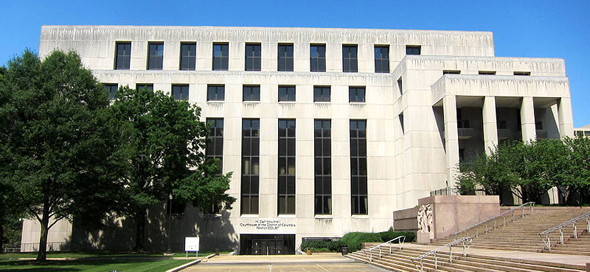The H. Carl Moultrie Courthouse, where the Superior Court of the District of Columbia is located. Photo courtesy of Wikimedia Commons and AgnosticPreachersKid.
After months of delays, Nico Dauphine went on trial yesterday, charged with attempted animal cruelty. And according to court documents, she’s got plenty of help.
Ed Clark, president of the Wildlife Center of Virginia, has been called as an expert witness. Clark is an outspoken critic of “the establishment and maintenance of feral cat colonies in wildlife habitat,” though it’s not clear if he holds the same view of cats in urban areas such as Columbia Heights, where the attempted poisoning is said to have taken place.
It’s also not clear if he’ll actually get to testify (I’m told two witnesses took the stand today, but no names were provided). Earlier this month, government attorneys filed a Motion in Limine to Exclude Testimony of Defendant’s Experts, arguing that “Mr. Clark’s proffered testimony regarding ideological debate and the environmental effect of cats has no probative value with respect to the issue before the Court.”
“Defendant has proffered that Mr. Clark will testify regarding the ‘ongoing debate between veterinary and wildlife conservationists and members of the public who support the feeding and maintenance of feral cats.’ This debate, assuming that comprehension of it is outside the ken of the average layperson, is irrelevant as far as the issue before this Court. The sole issue before the Court is whether Defendant intentionally attempted to poison cats that ate or would have eaten the food left in front of Park Square by Ms. Sterling. In other words, the state of the debate between conservationists and cat enthusiasts will not provide any insight as to whether Defendant committed the acts that have been alleged and which constitute the crime of attempted cruelty to animals. Furthermore, the proffered ‘debate’ testimony does not go toward the United States’ ability to establish any element of the crime charged.
Similarly, ‘the effect of feral cats on the environment,’ which Defendant has proffered also will be the subject of Mr. Clark’s testimony, is not relevant in this case and should be excluded.”
The motion goes to outline the prosecution’s concerns about Clark’s expected testimony regarding the “reasonable steps an expert in this field would take to preclude the feeding of feral cats.”
“The United States assumes that Mr. Clark intends to testify that Defendant, as a wildlife conservationist, would not have poisoned cats in order to prevent the feeding of feral cats. This testimony would beg the question, asking the Court to assume that Defendant acted reasonably. Of course, the United States’ position is that Defendant acted unreasonably—indeed, criminally—by attempting to poison cats.”
“At bottom,” the motion continues, “it appears that Mr. Clark will be called to testify to the ultimate fact at issue in this case: whether Defendant poisoned cats… However, Defendant has not proffered that Mr. Clark has any specialized knowledge of or experience regarding Defendant’s behavior.”
Last week, Dauphine’s attorneys filed a motion in opposition to the government’s motion. They also added “super lawyer” [1] Billy Martin to the team.
Martin is best known for representing such high-profile clients as Michael Vick, NBA players Allen Iverson and Jayson Williams, former Atlanta Mayor Bill Campbell, Monica Lewinsky, and former Prince George’s County Executive Jack Johnson, though his background includes a stint at the U.S. Attorney’s office “where he quickly rose up the ranks, prosecuting drug dealers, politicians, white collar criminals, corporations, corrupt cops, and organized crime figures.” [1]
A 2007 profile in Ebony describes Martin as one of the nation’s best—one of the few “on that very short list of high-powered, high-priced litigators who the rich and famous, and sometimes the infamous, turn to when they get into really big trouble.” [1]
That’s a lot of fire power for a “misdemeanor carrying a maximum penalty of 180 [days] in jail and a $1,000 fine.” I wonder who’s picking up the tab.
Literature Cited
1. Harris, R., “Super Lawyers.” Ebony. 2007. 62(11): p. 218–222.

